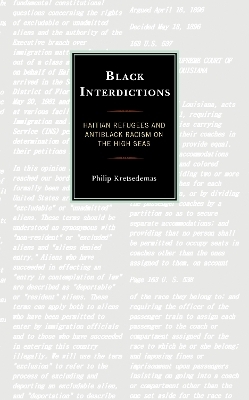
Black Interdictions
Haitian Refugees and Antiblack Racism on the High Seas
Seiten
2022
Lexington Books (Verlag)
978-1-7936-3072-8 (ISBN)
Lexington Books (Verlag)
978-1-7936-3072-8 (ISBN)
Black Interdictions exposes the antiblack racism that was latent in the US government's Haitian refugee policies of the 1980s and the 1990s, setting the tone for the criminalization of migrants and refugees in the new millennium.
Haiti is the first, and only, modern nation-state to be created as the result of a successful slave revolution. However, since its emancipation, the Haitian state has been forced to pay Western states compensation for the loss of the enslaved people, contended with a chronically unstable and authoritarian state system, and has been ranked as the poorest economy in the Western hemisphere. Black Interdictions exposes the antiblack racism latent in the US government's Haitian refugee policies of the 1980s and 1990s that set the tone for the criminalization of migrants and refugees in the new millennium and lead to the migration and refugee policies of the Trump era. Within this experience of controlled mobility many Haitians find themselves in a devastating catch-22, unable to survive in their home nation and unable to find a better way of life elsewhere due to border enforcement strategies, strict immigration policies, and unprecedented measures to prevent asylum claims. This type of radical exclusion is singular to the black experience and the black/nonblack binary must be factored into an analysis of the US migration regime. It shows how techniques of control applied to black populations, whether free or slave, migrant, or native-born, have been precursors for policies and practices applied to nonblack migrants and refugees. It is not possible to work together for equity and justice if we are not prepared to grapple with this divisive history and the instinct to avoid dealing with the singularity of the black experience participates in the orders of knowledge and power that have been fostered by antiblack racism. This book will be of interest to scholars of migration and refugee studies, black studies, legal studies, public policy and international relations, and many others.
Haiti is the first, and only, modern nation-state to be created as the result of a successful slave revolution. However, since its emancipation, the Haitian state has been forced to pay Western states compensation for the loss of the enslaved people, contended with a chronically unstable and authoritarian state system, and has been ranked as the poorest economy in the Western hemisphere. Black Interdictions exposes the antiblack racism latent in the US government's Haitian refugee policies of the 1980s and 1990s that set the tone for the criminalization of migrants and refugees in the new millennium and lead to the migration and refugee policies of the Trump era. Within this experience of controlled mobility many Haitians find themselves in a devastating catch-22, unable to survive in their home nation and unable to find a better way of life elsewhere due to border enforcement strategies, strict immigration policies, and unprecedented measures to prevent asylum claims. This type of radical exclusion is singular to the black experience and the black/nonblack binary must be factored into an analysis of the US migration regime. It shows how techniques of control applied to black populations, whether free or slave, migrant, or native-born, have been precursors for policies and practices applied to nonblack migrants and refugees. It is not possible to work together for equity and justice if we are not prepared to grapple with this divisive history and the instinct to avoid dealing with the singularity of the black experience participates in the orders of knowledge and power that have been fostered by antiblack racism. This book will be of interest to scholars of migration and refugee studies, black studies, legal studies, public policy and international relations, and many others.
Philip Kretsedemas is associate professor of sociology at University of Massachusetts, Boston.
Introduction: Black Interdictions
Chapter 1: Navigating the Chasm: Antiblackness, Mobilities, and the Law
Chapter 2: Sovereign Bodies and the Law: A Pre-History of the Antiblack Racism Underlying
the US Government’s Haitian Refugee Policies
Chapter 3: Radical Exclusion
Chapter 4: Challenging the Interdictions
Chapter 5: Reconfiguring the Black/Nonblack Binary: The Radical Exclusion of Haitian and
Cuban Refugees in the Era of Operation Sea Signa
Chapter 6: The Radical Exclusion of Haitian, African and Central American Refugees in the
Trump Era
Chapter 7: A Legal Strategy for the End of the World, and Beyond
| Erscheinungsdatum | 09.03.2022 |
|---|---|
| Verlagsort | Lanham, MD |
| Sprache | englisch |
| Maße | 161 x 227 mm |
| Gewicht | 712 g |
| Themenwelt | Recht / Steuern ► EU / Internationales Recht |
| Recht / Steuern ► Öffentliches Recht ► Besonderes Verwaltungsrecht | |
| Sozialwissenschaften ► Soziologie | |
| ISBN-10 | 1-7936-3072-0 / 1793630720 |
| ISBN-13 | 978-1-7936-3072-8 / 9781793630728 |
| Zustand | Neuware |
| Haben Sie eine Frage zum Produkt? |
Mehr entdecken
aus dem Bereich
aus dem Bereich
Grundwerk ohne Fortsetzung. Rechtsstand: 1. September 2024. …
Buch | Hardcover (2024)
C. H. Beck (Verlag)
CHF 109,95
Polizei- und Ordnungsrecht, Kommunalrecht, mit Bezügen zum …
Buch | Softcover (2021)
Vahlen, Franz (Verlag)
CHF 36,25
Handbuch des Wirtschaftsstraf- und -ordnungswidrigkeitenrechts
Buch | Hardcover (2024)
Verlag Dr. Otto Schmidt KG
CHF 348,55


